That might seem like a strange headline but this topic is a surprisingly big part of my job at the zoo. Multiple times a week, I receive calls from people asking me to take their pets, both exotic and domestic animals. Usually it is because they are no longer able to care for their pet and are hoping that we can take it and give it a home. Unfortunately, space and resources are always consideration so in the majority of cases, we are not be able to provide a home for your pet. At the end of this blog, there are some suggestions on how to find a home for your pet if you find yourself in this situation.
That’s why I wanted to share with everyone how important it is to do your research before deciding to add an animal friend to your family. By knowing what you are getting into in advance, you can make sure that you will be able to provide for your animal companion for its entire life. Domestic animals are usually the best suited as companions but exotic species can also make for good additions to the family if you know how to provide for their needs. Even with domestic animals, people are sometimes surprised by the level of commitment required to take good care of their pet and then feel bad if they cannot fulfill those requirements. The key is to be prepared before you even add the companion animal to your family. This way you do not end up trying to find a home for it if you realize that you cannot meet the needs of the animal.
Some important factors to consider:
How long is the animal expected to live?
If well taken care of, species like turtles and parrots can live for many decades, sometimes a long as 60 or 70 years! Your pet might outlive you so are you prepared to find another home if that happens? Do you want a pet that is a lifetime commitment?
What special foods will it need?
Many reptiles suffer from metabolic bone disease because they do not get adequately balanced diets. They require specific ratios of calcium and phosphorus and should be fed diets that are carefully balanced. Parrots should not be fed seed-based diets for a similar reason. Seed diets are not balanced nutritionally and allow the bird to pick its favorite seeds which is a little like letting a child pick out all their food. I want ice cream instead of my vegetables too, but I know that is not good for me! Specially formulated pellets for parrots get around that problem by providing balanced nutrition in every bite.
Species such as snakes will need whole mice or rats to eat. Are you comfortable handling dead mice to feed your pet?
Feeding predators live prey presents an ethical dilemma – what about the welfare of the mouse? Most snakes will readily feed on dead thawed mice, which is considered more humane than putting a live mouse in with a snake where it would have no opportunity to escape as it would in the wild.
Does it need special housing?
Many people purchase cute little baby turtles like red eared sliders without realizing the commitment needed for aquatic turtles. These turtles need a terrarium with water and land, and are very messy, so they require lots of cleaning to maintain. Adding to that, is that they can easily live for 30 years. Do you want to have a high maintenance pet for that long? Other species require special things like UV light and heat supplementation if they are housed indoors. Reptiles are the best example of this requirement but there is emerging evidence that other species like birds need to have UV exposure as well to maintain health and good feather condition.
How big will it get?
It is NOT true that fish or reptiles will only grow as large as the enclosure they are kept in. Both fish and reptiles continue to grow for their whole life, and if they are not growing, they are stunted because of improper care, not the size of the enclosure they are kept in. That tiny little iguana you might see will end up topping off at over 6 feet in length and will require a room sized enclosure. Be sure to plan for the full adult size of your pet, not what you have available now. If you don’t want to give a room of your house to an iguana, consider a species like a bearded dragon which will top off at 12-14” in size.
Ethical and conservation considerations
Some species are collected illegally from the wild. Be extra careful that you are not supporting the worldwide trade in animals. The sales of millions of animals every year is driven by the desire for exotic pets. Unfortunately, many of these animals are kept in horrendous conditions after they are captured, and a majority die before they even made it to sale. Much of this demand is for the desire for novelty as a pet. This is simply not worth the suffering to all of these animals and drives some species even closer to extinction. Many animals being sold online are marketed as captive-bred but this is not always accurate. The best way to make sure that you are getting a captive-bred animal is to contact hobbyists for breeder recommendations, and to research potential breeders to make sure they operate responsibly and humanely. One easy way to avoid this problem is to stick with domestic animals – dogs and cats are not endangered and so many are in need of good homes! Even exotic pets need to be adopted, though, so contact rescues or look on Petfinder.com rather than purchasing an animal that feeds the pet trade.
Avoid impulse purchases of a pet
The cute chick or baby rabbit you see around Easter is going to grow up quick and live a long time. A chicken can live 4-8 years and is a much different animal than that fuzzy little chick. A rabbit can live 8-12 years and requires exercise and attention to be happy and healthy. Similarly, do not participate in activities that give out animals as prizes. This continues to perpetuate the idea of animals as disposable pets. Social media also has a hand in driving the desire for exotic pets. Remember to keep in mind all of the important aspects of being a responsible pet owner, and do not let that adorable picture of a famous person cuddling override logic in deciding on a companion animal.
Species we most frequently get calls about re-homing:
-
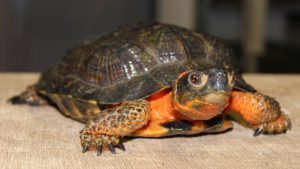
- Wood Turtle
-

- Parrots
-
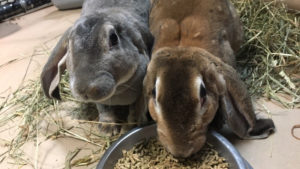
- Rabbits
-
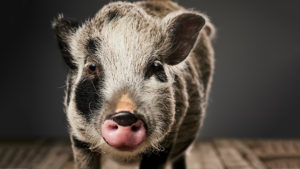
- Pigs
-
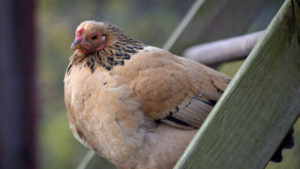
- Chickens
-
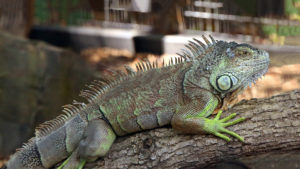
- Iguanas & other large reptiles
Keep in mind that a lot of the knowledge on how to care for exotic animals is not easily available and that professional zoo staff spend their entire career continually learning and improving care for the species they work with. You will have to do a lot of research to make sure that you have the best, most accurate, and latest knowledge if you want to keep an exotic animal as a pet. It is not impossible but it is a commitment you accept when you decide you want an exotic animal as a pet.
What to do if you already have a pet you need to re-home?
If you find yourself in this situation, remember that most zoos are not likely to be able to take your pet. You can inquire, but do not be surprised if you do not get a response or receive a no as answer simply because of the volume of these requests. Responsible zoos follow what is called a collection plan where the research has been done to plan the spaces available in the zoo. This means that most of the spaces, even when temporarily empty, have plans for what will be filling them to meet guest experience, conservation and educational goals. Unless your pet fits into those plans, a zoo will not likely be interested in taking your pet.
A more fruitful approach would be to search for specific species rescues. There are a number of privately operated rescues that help with placement of unwanted pets. For example, there are bird and reptile rescues all over the country. These are often good places to start with requesting help in placing your pet. Internet searches with terms such as “rescue Pennsylvania” will give you lots of options to explore. Searching for clubs is another angle to explore. For example, there are bird clubs in Pennsylvania such as the Chester County Bird Club that have enthusiasts that could provide you with advice in finding a home for your bird.
Keep in mind that many rescues are labors of love and so people do this on a voluntary basis. They are sometimes not able to take animals directly but instead work with networks of others that help foster or provide homes for animals in need. Red eared sliders are among the hardest to place species at this time as they are easy to breed, cheap to buy and start off small so people do not realize what they are getting into. There is a glut of sliders that need homes already in rescue which makes placement of this species particularly challenging.
Another option would be to post your animal on a service like Petfinder. This will help get people in contact with you who might be looking for a pet. Remember to always verify any potential homes for your pet and make sure new owners understand the commitment they are taking on, otherwise we just continue to perpetuate the problem!
Written by: Former EPZ General Curator Marina Haynes

